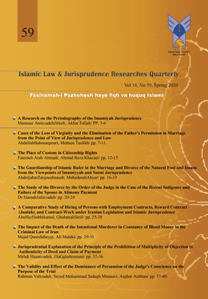The Impact of the Death of the Intentional Murderer in Constancy of Blood Money in the Criminal Law of Iran
Subject Areas : Private lawMajid ghourchibaygi 1 , Ali Maleki 2
1 - , Assisstant Professor, Department of Law and Political Sciences, Kharazmi University, Tehran, Iran
2 - , Department of Jurisprudence and Criminal Law, Kharazmi University, Tehran, Iran
Keywords: Intentional murder, blood money, Lapse of Retaliation, Death of the Murderer, No-Waste of Muslim Blood,
Abstract :
The death of the intentional murderer is one of the instances that renders impossible the execution of retaliation (qisas) since the location for the execution of the retaliation which is the physical body of the murderer is eliminated. There has long been controversy among jurists over the payment of blood money for murder in the case of the death of the murderer in deliberate homicide. Some jurists believe in the lapse of blood money with the death of the murderer. On the other hand, some other jurists consider the constancy of the payment of blood money with the impossibility of retaliation. And some even consider an elaboration and take a middle ground. Legislature is also affected by this diversity so that, before the approval of penal code in 1392, the legislators approved the lapse of blood money, but in the new penal code the previous attitude was abandoned and constancy of blood money is accepted. This paper examines the reasons and evidence of the opponents and advocates and elaborates on the quality of the inclusion in the rule of "No-Waste of Muslim Blood" on the issue of the death of the intentional murderer and considers the aforementioned rule is as the reason behind the ascertainment of blood money. This paper also demonstrates that, in the three situations recognized by tradition, the person responsible for payment of blood money differs in the death of the murderer of the third party compared to the two other kinds of murder.
* قرآن کریم
_||_
Alidoost. A. (1391). Jurisprudence and Reason (5th ed.). Tehran: Islamic Culture and Thought publications.
Allameh Helli, H. (1410). Irshad al-Az'han ila Ahkamal-Iman (1st ed.). Qom: Office of Islamic Publications Affiliated with Qom Seminary Community.
Allameh Helli, H. (1413). Mokhtalif al-Shia (1st ed.). Qom: Office of Islamic Publications Affiliated with Qom Seminary Community.
Allameh Helli, H. (No date). Tazkarat al-Foqaha. (1st ed.). Qom: Al Al-Bayt Institute.
Amelli (Shahid Thani). Z. (1413). Masalik al'-Afham ila Tanqih-e Sharia al-Islam (1st ed.). Qom: Al-Ma'arif Al-Islamia.
Amelli (Shahid Thani). Z. (1433). Al-Rozah al-Bahi'a fi Sharhi Lom'ah al-Damashqia(1st ed.). Qom: Majma Al-Fikr Islami.
Ardabili, A. (1403). Majma' al-Faida wa al-Borhan fi Sharh-i Irshadal-Az'han (1st ed.). Qom: Islamic Publications Affiliated with the Qom Seminary Scholar Community.
Group of authors. (n. d.). Fiqh Ahl Bayt Magazine(1st ed.). Qom: no publication.
Haji Dehabadi, A. (1391). Criminal Rules of Jurisprudence(3rd ed.).Qom: Institute of Seminary and University.
Helli, M. (1410). Al-Sara'ir al-Havi li Tahriral-Fatawa. Qom: Office of Islamic Publications Affiliated with the Qom Seminary Scholars Community.
Holy Quran
Hor Amelli, M. (1409).Wasail al- Shia(1st ed.). Qom: Al Al-Bayt Institute.
Ibn Zohra, H. (1417). Qoni'atal-Nozu ila Ilmal-Osul waal-Foru (1st ed.). Qom: Imam Sadeq (PBUH).
Jafari Landerudi, M. (1391). Mabsoot Law Terminology (5th ed.). Tehran: Ganje Danesh.
Kashif Al-Qita Najafi, M. (1359). Tahrir al-Jomla(1st ed.). Najaf: Al-Maktab Al-Mortazaviya.
Khomeini, S. R. (n. d.). Tahrir al-Wasilah )1st ed.). Qom: Dar Al-Elam Publication Institute.
Khui, A. (1394). Mabani Takmalatal-Minhaj (5th ed.). Tehran: Khorsandi.
Makarim Shirazi, N. (1424). Ketabal-Nikah (1st ed.). Qom: Imam Ali IbN Abitalib Seminary.
Marashi Najafi, S. (n.d.). Al-Qisas ala Dhou al-Quran wa Sonnah. Qom: no publication.
Mirmohammadsadeqi, H. (1392). Crimes against the Person. (12 th ed.). Tehran: Mizan.
Mohammadi, A. (1391). Description of Principles of Jurisprudence (13th ed.). Qom: Dar Al-Fikr.
Mohammadi, A. (1391). Description of Rasa'il (6th ed.). Qom: Dar Al-Fikr.
Mozafar, M. (1433). Principles of Jurisprudence (1st ed.). Qom: Boustan Ketab Institute.
Najafi, M. (1404). Jawahir al-Kalam fi Sharhi Sharaye al-Islam (7th ed.). Beirut: Dar Al-Ihya Al-Torath Al-Arabi.
Omani, H. (1413). Hayati Ibn Abi Aqilwa Fiqhi (1st ed.). Qom: Al-Mojam Al-Fiqhi Center.
Research group of law in Islamic science of Razavi University. (1383). Criminal Rules of Jurisprudence (2nd ed.). Mashhad: Razavi University of Islamic Sciences.
Sabzevari, A. (1413). Mohaz'zabal-Ahkam fi Bayan al-Halal wa al-Haram. (4th ed.). Qom: Al-Minar Institute.
Sarikhani, A, Aqababai, I., & Attarzade, S. (1392). Consensus of opinion and its Role in Deduction of Criminal Sentences. Journal of Islamic Law and Jurisprudence Researches,9 (32), 27-48.
Shakeri Golpayegani, T. (1381). Juridical and Legal Analysis of the Principle of "Muslim Blood is not wasted". Tehran: Neddaye Sadeq Quarterly
Tarihi, F. (1416). Majma al-Bahrain (3rd ed.). Tehran: Mortazavi Bookshop.
Tusi, A. (1407). Tahzib al-Ahkam. (4th ed.). Tehran: Dar Al-Kotob Al-Islamiah.
Tusi, A. (n.d.). Al-Khalaf. (1st ed.). Qom: Office of Islamic Publications Affiliated with the Qom Seminary Scholars Community.
Tusi, A. (1387). Mabsoot fi Fiqhal-Imamiyah (3rd ed.). Tehran: Al-Maktab Al-Mortazaviya li ihya' Al-Asar Al-Jafaria.
Tusi, A. (1414). Al-Rasa'il al-Ashr (2nd ed.). Qom: Office of Islamic Publications Affiliated with the Qom Seminary Scholars Community


